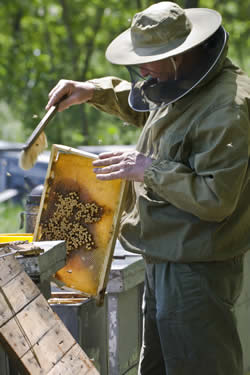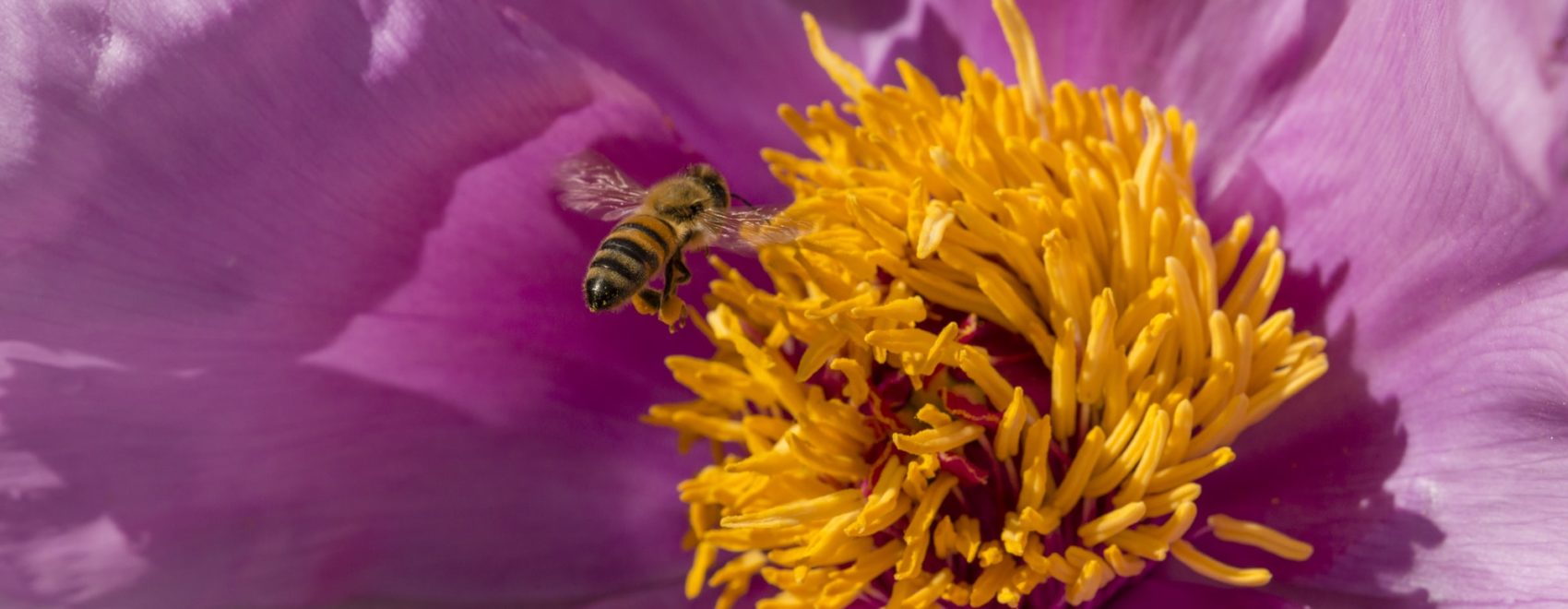Honeybees – The Forgotten Livestock

When we think of livestock for survival and in general, we tend to think of four legs and fur. However, in terms of return in the form of a diversity of highly useful products, we should take a step outside that box and think in terms of six legs and an exoskeleton.
I refer to the honey bee.
I have a farmer’s market friend who is a serious bee keeper, homesteader, and (go figure!) a prepper. He got me thinking about bees recently by telling me that in his opinion the bee is nature’s perfect prepper and one of the most useful critters that a human prepper can keep. I considered his points and am forced to admit that he may very well be right.
I will not use this space to discuss many of the specifics of beekeeping. I have a single hive in my orchard, and my methods, or lack thereof, are a source of constant derision from my serious bee keeper friends.
Let’s just say that I am still developing those skills and that other things often seem more pressing, a poor excuse but the only one I have. There are plenty of resources available to teach you the needed skills should you choose beekeeping as part of your livestock program.
These include books, blogs, websites, and other bee keepers. Instead of addressing the methods, I would like to present the case for keeping bees from a prepper’s point of view.
The Benefits of Beekeeping
High on the list of reasons to keep bees is the role they play in pollinating your garden or orchard. We often take the bee for granted in this role, but the truth of the matter is that bees are in trouble. The jury is still out on why bees are vanishing, but there is a short list of the usual suspects.
Possible culprits range from chemical pesticides to GMO crops. Whatever the reasons, the best way to ensure that your crops will continue to be pollinated is to keep a hive nearby. This imposes a responsibility to use organic, chemical-free gardening methods and non-GMO seeds, but these methods make the most sense for a prepper anyway.
Honey is the Perfect Storage Food
The next reason to keep bees is the most obvious, honey! A strong healthy hive can produce 50 pounds or more of honey for its keeper each year. When the supermarkets close, the supply lines are cut, and sugar and other sweeteners are hard to come by, a reliable source of honey will be invaluable.
Honey is about the perfect storage food, with a shelf life measured in centuries (edible honey has been recovered from Egyptian pyramids). Honey is a great source of calories, boosts the immune system, can be used in baking and canning, is the starting point for honey Meade, and is a great topical antibiotic. Eating raw local honey can even help fight allergies and colds. In short, an incredible food.
Beeswax for Candles and Soap
The next reason to keep bees is wax. Bee’s wax is another amazing product. It can be used to make long burning, drip-less candles perfect for grid-down scenarios. Bee’s wax can be used to make lip balms when the Carmex is gone. Bees wax can be used in homemade soap as a hardener to extend its life.
There are a host of other uses for bees wax ranging from waterproofing leather to waxing your wood furniture. Again, a source of bee’s wax won’t let you down in a long term crisis situation.
Medicinal Properties of Honey and Bee Pollen
There are a couple of lesser known bee products of medicinal and nutritional value. Propolis, which is the glue that bees make to repair and weatherproof their hives, has antibiotic properties that can be used to fight infection. Some research also indicates that propolis also has anti-inflammatory, anti-viral, and wound healing properties.
Propolis can be collected for hives and would be good to have available when the pharmacy shelves are bare. Bee pollen is one of the most complete and compact foods in nature. It is loaded with vitamins, minerals, enzymes and proteins.
Bee pollen has been used for centuries in Chinese medicine to boost energy, fight acne, fight depression, aid in indigestion, and improve blood pressure. Pollen traps can be installed on hives to collect this awesome product.
Backyard Beekeeping
Bees can be kept anywhere. Rural preppers will have no trouble finding a convenient spot to locate a hive or two. Suburban preppers can keep a hive in the back yard, with a few precautions such as a small fence to keep kids and pets from stumbling into it and an obstacle that forces bees to fly high on the way out of the hive.This obstacle will disperse bees on their way out to forage, preventing a concentrated stream of bees in your neighbor’s yard.
Neighbors should be made aware of your beekeeping, and efforts should be made to discourage them from using chemical pesticides (Sevin Dust is one of the worst offenders, bees can pick it up like pollen, carry it home and wipe out the hive). Even urban preppers can keep bees. Hives can be sited on balconies or rooftops, again with a few common sense precautions.
Bees have gotten a bum rap. They are actually amazingly docile and easy to work with. They can live in very close proximity to your home without presenting any danger, with a bit of common sense on your part. They are nature’s little preppers, gathering and producing all they need and storing it away for lean times.
Beekeeping isn’t for everyone, and does require a bit of work and a new skill set. But, if bees fit your lifestyle, they could one day prove to be one of your most valuable preps.
Want to find out more about raising livestock? Read our article Raising Livestock as Part of Your Survival Plan.


[…] Establish bee colonies for honey, wax, and pollination […]